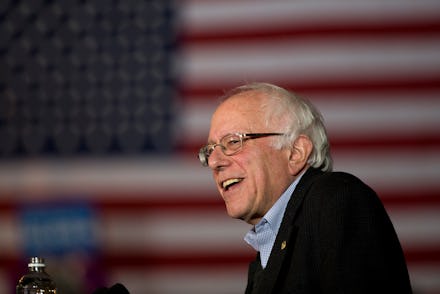If You Think Bernie Sanders Is Finished, Check Out These 3 Charts

During the Democratic presidential debate in New Hampshire last month, former Secretary of State Hillary Clinton largely looked past chief rival Sen. Bernie Sanders (I-Vt.), opting instead to sharpen the contrast with Republicans as she looked ahead to the general election.
In recent weeks, however, Clinton has trained her sights back on Sanders, hammering him over his gun control record and suggesting that a Sanders nomination would effectively hand the presidency to the Republican Party. Clinton's more aggressive approach comes amid evidence that the contest for the Democratic nomination is tightening with just three weeks to go until the kickoff Iowa caucuses on Feb. 1.
As Sanders barnstorms the the country with his popular message of alleviating income inequality and taking on Wall Street, the political chattering class is buzzing over the possibility that he could defeat Clinton in Iowa and New Hampshire, upending the notion of Hillary the Inevitable.
Is it déjà vu? Clinton's been here before. Confronted with a spate of damaging headlines last summer on her use of a private email account as secretary of state, the once-overwhelming frontrunner watched her poll numbers take a hit, as voters voiced doubts about her trustworthiness and Sanders wowed progressives with his unapologetically populist pitch. The senator from Vermont pulled ahead in neighboring New Hampshire and in some Iowa polls, underscoring Clinton's vulnerability.
But Clinton was able to right her campaign's ship in October, starting with a commanding debate performance that helped convince Vice President Joe Biden not to jump into the race and culminating in her marathon testimony before the House Select Committee on Benghazi, where Clinton's even-keeled performance prompted many Democrats to rally behind her candidacy and Republicans to rethink just how easily beatable she'd really be.
As a resurgent Clinton rebuilt a substantial lead in Iowa and eroded Sanders' advantage in New Hampshire, the senator found himself in a fight for relevance, seeking to prove he was more than a cranky gadfly. When Clinton treated Sanders with kid gloves in the most recent Democratic debate, it seemed to confirm the conventional wisdom that he posed no real threat.
But Sanders' legion of progressive fans didn't get the memo that their candidate was a lost cause, helping him shatter grassroots fundraising records and build a viable early state organization, even as Clinton consolidated establishment support. With policy-centric speeches like his address on Wall Street reform last week, Sanders hopes to woo more wavering Democrats into his camp.
It's an uphill fight, but it may yet work. New poll numbers help shed light on why Clinton is amping up her attacks on Sanders now, as Sanders holds onto a lead in the Granite State and narrows the gap in Iowa and nationally.
Iowa
For Sanders, a come-from-behind win in Iowa would provide crucial momentum as he heads into the Feb. 9 primary in New Hampshire, where his lead is durable but vulnerable. An NBC News/Wall Street Journal/Marist poll of Hawkeye State Democrats provided his campaign with a jolt of adrenaline over the weekend: It showed Clinton up just 3 percentage points, 48% to 45%, with former Maryland Gov. Martin O'Malley trailing at 5%.
Three of the last five Iowa polls have shown a single-digit race, and the RealClearPolitics polling average attests to the tightening contest: While Clinton was racking up leads of around 20 to 30 points late this fall, she's now ahead by just 49.4% to 38.8%.
New Hampshire
Meanwhile, the NBC News/Wall Street Journal/Marist poll gave Sanders a 50% to 46% edge in the Granite State — a finding that comes on the heels of a Fox News poll last week that showed Sanders leading Clinton 50% to 37%. According to the RealClearPolitics average, Sanders is up 48% to 43.3% in the state, after Clinton nearly surpassed him this fall.
Nationwide
After Biden announced in late October that he wouldn't run for president, most of his support accrued to Clinton, who built a lead of about 25 percentage points over Sanders. As the voting nears, however, her lead is getting smaller: She's led most polls for the past month by about 15 points, and the RealClearPolitics average now shows her slipping below the 50% mark, earning 48.3% support to Sanders' 35.5% and O'Malley's 3.8%.
And if he wins? Say Sanders comes out of Iowa and New Hampshire with a 2-0 record. Given Clinton's financial resources and the demographic makeup of the states that follow, she will still be in a strong position to secure the party's nod; indeed, two consecutive losses may lead prominent Democrats who are now publicly neutral to rush to save her candidacy. (An endorsement from, say, Sen. Elizabeth Warren of Massachusetts would be a major coup.)
But while wins in Iowa and New Hampshire wouldn't make a Sanders victory a sure thing, they would substantially alter the contours of the Democratic race. In Nevada, whose caucuses follow the New Hampshire primary, Sanders is well-positioned to capitalize on momentum coming out of the first two contests. As Politico reported last week, Sanders now has almost twice as many field staffers on the ground there, and he's outspending Clinton on the Silver State airwaves.
On March 1, 11 states will hold caucuses or primaries, presenting Sanders with yet another opportunity to run up the score. In a conference call with reporters last week, campaign manager Jeff Weaver declined to identify which states Sanders is targeting for victory on that date.
"Although the media likes to focus on the, quote, wins and losses, this is a proportional allocation system for delegates, and we're very focused on delegate counts," Weaver said. "At the end of the day, that's what matters. You need delegates to win at the convention."
Get the five stories that will challenge you to rethink the world by signing up for MicCheck Daily.